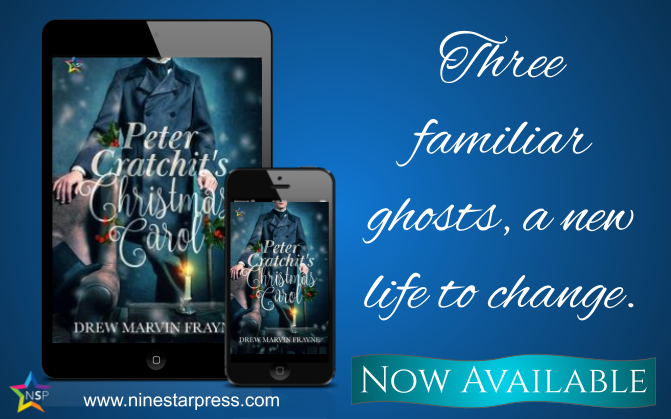
Title: Peter Cratchit’s Christmas Carol
Author: Drew Marvin Frayne
Publisher: NineStar Press
Release Date: November 18, 2019
Heat Level: 3 - Some Sex
Pairing: Male/Male
Length: 36100
Genre: Historical Holiday, LGBT, Christmas, romance, fairy tale, businessmen, ghost, prostitution, poverty, 19th century England, pirates, tear-jerker, time travel
Add to Goodreads

Synopsis
Peter Cratchit, a young lad preparing to
make his way in the world, is the eldest son of Scrooge’s lowly clerk Bob
Cratchit. Peter flourishes under the tutelage of his “Uncle” Scrooge and seeks
to make his mark as a man of business, like his uncle before him.
One Christmas Eve, as Scrooge lays
dying, Peter embarks on a risky ocean voyage that he believes will secure the
future for his family. Onboard, Peter finds love, happiness, and success, only
to lose it all by the voyage’s end.
Returning to London, Peter shuns his
family and instead finds himself living on the streets, haunted by his failures
and his dead lover, selling his body just to survive while he waits for the
winter cold to claim him once and for all. But winter snows also mean Christmas
is coming, and for the Cratchit family, Christmas is a time of miracles. Can a
visit from three familiar spirits change Peter’s life again? Is there one more
miracle in store for the lost son of one of Dickens’ most enduring families?
Excerpt
Peter Cratchit’s Christmas Carol
Drew Marvin Frayne © 2019
All Rights Reserved
Scrooge was dead: to begin with. There
is no doubt whatever about that. He died some two years past on this very day,
Christmas Eve. I would it were not so; yet I suspect the old man would not
agree. He became rather infirm at the end, frail and forgetful, and though he
did his best to remain cheerful, I know he hated to show weakness of any kind.
It wasn’t a matter of pride, nor vanity; no, it wasn’t for his sake that he
cared so. It was that, as he himself often said, he had become a sort of
safeguard, a protector, to his family and to his community, and he hated the
thought of us carrying on without him there, watching over us all. And we, of
course, would clasp his hand and tell him that he would be looking over us in
the next life, and that such thoughts brought us great comfort, and they should
bring him great comfort too. And he would sigh, and agree with us, and settle
in, at least for a while, until another great spasm wracked his breast, and his
chest would heave with immense, raggedy gasps for air, and his worries arose
all over again.
He died a good death, if it could be
said that any death should be regarded as good. Though I have not spent nearly
as many years as Scrooge did on this planet, I have knocked about a bit, and
circumstance has shown me both great fortune and great tragedy. And as such, I
have come to believe there is no good death to be had in this world. I have
seen many poor wretches, past all hope of recovery from whatever it was that
ailed them—whether it be an infliction of the body or the soul—beg for death,
pray for it, and have watched it come in many guises, be it the cold, or the
cough, or the cutthroat. I have seen their prayers answered, even if those
answers came in some form of pain they had never envisioned. And yet I say,
when the end did finally come, each and every one begged to stay, begged for
their final breath to be forestalled, begged to live for even one moment more.
Yea, though I have been on this world for less than a quarter of a century, I
have come to know its horrors and have learned the greatest horror of all is
that there is no world, no life, beyond this one.
Scrooge would not have agreed with this;
oft he told us the tale of his visitation by his old friend, Jacob Marley, dead
seven years in the grave before his return, and the further visitations by the
three spirits who haunted him, also on a Christmas Eve. To Scrooge, there was
no greater evidence of providence than this, and he lived such feelings in his
heart for the rest of his life. I was glad of it; we all were, all of London
town, though those of us who were closest to him felt his change of heart and
his largesse most keenly. And many was the time, as a young man, on a Christmas
Eve like this one, I sat cross-legged on the floor at Scrooge’s feet and
listened to his tales of Christmas ghosts and astonishing spirits, of
visitations to the past, and of the wondrous things that are yet to come.
Yet even then, I was a skeptic. After
his tale was complete, Old Scrooge, as wise at reading faces as he was at
managing his business, would frequently tousle my hair and tell me, “Young
Master Peter, you must have the conviction of your faith. It is not enough to
simply believe; you must know Christmas, and keep it in your heart all the year
long.” Such words were enough for Tim and for the others; but I, I would only
smile, and say, “Yes, Uncle Scrooge,” in a manner and tone that were always
respectful, but that the cunning old man also knew to be mollifying. And
Scrooge would then bend quite low—for he was a tall, wizened old fellow, and I
have always been inclined to be undersized—and he would say to me, “You must
not fear the world so much, Peter Cratchit.” And I would nod, and he would pat
my cheek, or sometimes playfully pinch my nose. But what he meant by those
words, I cannot say. In my experience, there is much to fear in this world, and
much calamity the world will set upon the unwary soul who is not ever vigilant.
A growl in my stomach disturbed my
thoughts. Time to dispense with these ruminations on the past; I was hungry. I
willed my body out of its bed, a small recess in the side of a crumbling brick
building used for the storage of livestock, a cramped pen to house the beasts
before they were led to slaughter. The recess provided some shelter from the
elements; there had been rain last night, so it was useful to keep dry, though
the rain had been only a drizzle, and the weather was unseasonably temperate
for so late in December. That was no small mercy.
The recess had once been a side door,
now sealed up, when the building had been used for some other purpose, long
forgotten to time. The smell of animal excrement that clung to the building—and
to those who worked or, like me, dwelt within her—was formidable, but it also
meant the alley I called my home remained deserted during the nightly hours.
Safety in this life often comes at great cost. Those who have suffered at the
world’s hands know this lesson all too well. The men who tended the animals had
assembled a small cleaning station, clean water and a strong lye soap, behind
the building, and they charitably did not begrudge my use of it from time to
time, provided I did not tarry, and they did not see me. I hastened in my
morning ablutions and made my way out to the street.
There was a bakery on Saint Martin’s
Close; it was there I would seek to break my fast. Every morning, my repast was
the same: two hot buttered rolls and a small tankard of ale. The only
difference was whether the baker would tally the cost of his labors on my
tongue or on my tail.
I made my way down Carol Street to the
main Camden Road. I used to live on this very road, as a youth, but far down
the other end from those places where I now worked and resided. Camden Town was
named for Camden Road; the road was the heart of the ward, bisecting it in the
north and making up the entirety of its western edge. It was impossible to be
in Camden Town and avoid the Camden Road. And yet, in all of my wanderings
through this neighborhood, I always avoided the familiar façade of my former
house, with its chipped paint and ill-fitted front door. I was more interested
in the thick, oaken door that led to the alley behind the bakery, where the
business received deliveries of flour and other such supplies. I knocked. Some
days, the baker answered promptly, as if expecting me; other days, like today,
I had to wait. He was a busy man, having woke well before the dawn to assemble
his breads and rolls and pastries and cakes. His bakery was a small one, but he
did a good measure of custom, enough to keep him in flour and dough and sugar and
coal for the ovens. Still, he had only one boy to help him prepare the daily
wares—in this neighborhood, even relative prosperity resulted in genuine
poverty.
Whether the boy was his son, or some
urchin off the street, I do not know. The baker and I did not converse on such
matters. It was, in part, because the man’s well of English was so deficient
that any conversation would prove inconsequential at best. I could not identify
his native tongue, and he spoke only the English of a tradesman and knew the terms
for barter and exchange, and little more. My own English improved greatly under
the tutelage of Ebenezer Scrooge, who gave me books to read and provided
college-trained tutors to sharpen my intellect. I was beyond basic schooling by
the time our families came together; but my mind was quick and hungered for
knowledge, and Uncle Scrooge filled it with book after book on all manner of
subjects—history, literature, economics, philosophy, mythology, the principles
of business. I eagerly took it all in, save perhaps the poets, who I found too
disordered, too insubstantial, to truly relish. Still, for an occasion such as
this, the silver portion of my tongue was not really necessary. It was my
tongue’s other talents that the baker was interested in. I suppose, in the end,
this, like so much in life, was simply a matter of business. I needed what the
baker had to offer; he felt the same. Talk would only prolong the necessities
of exchange.
The man finally answered and hurried me
inside. In nicer weather, he sometimes took his payment in the alley, but he
did not like the cold and the damp, so he ushered me into a cramped cookery
room stuffed with coal- and wood-burning ovens. I had no objection to being
enveloped in warmth; it made for a pleasant change of atmosphere from my usual
status at this time of year.
I could see by the sights and sounds of
his distresses that my morning patron was more harried than usual. His eyes
were darting around the room. His gestures were quick, and rough, and
impatient. He was a large, hirsute man, with a rotund belly and a gray, prickly
beard, which, at the moment, was dusted in a rather generous supply of flour.
I was no longer fond of beards; I
generally preferred smooth-faced youths, like myself, and not the wooly chins
of older men, though, in my line of work, older men were my main custom. And
this was business, not pleasure, and the baker felt the same as I, especially
today. Even as he penned me into his back kitchen, he continued to bellow
orders to the boy out front. I often wondered what the boy thought of our
exchanges. Perhaps it was of no consequence to him. Perhaps he was grateful he
did not have to provide a similar service. Or perhaps he did. Who can say.
Purchase
NineStar Press | Amazon | Smashwords | Barnes & Noble | Kobo



No comments:
Post a Comment